How to Write a Cover Letter That Gets Noticed
8 Min Read | Feb 23, 2024
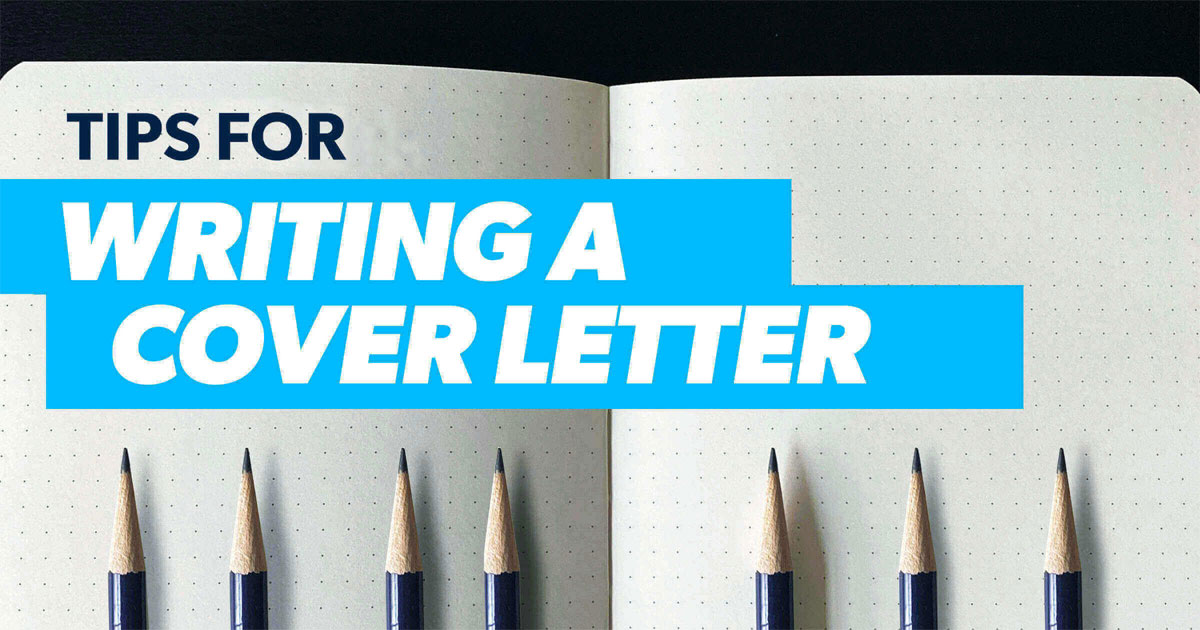
Job hunting isn’t for the faint of heart. You’re putting in extra hours after work, chipping away at application questions, polishing up your resumé, and hoping for the best. And to top it all off, you’ll sometimes have an extra item to check off your list: writing a cover letter.
Now, not all companies require a cover letter these days, so I wouldn’t worry about sending one unless the company you’re applying to asks for it. I’d rather you include the typical information found in a cover letter—like a summary of your experience and an explanation of why you want the job—in your resumé.
But if you’re filling out an application that does ask for a cover letter, write one! You want to show potential employers that you’re paying attention. So let’s go over the best method for writing a cover letter—the same one I teach on The Ken Coleman Show. We’ll also look at some sample cover letters to give you some extra direction and clarity.
What Is a Cover Letter?
A cover letter is a short letter written directly to the person who will read your job application and resumé. Traditionally, while your resumé is more of a high-level overview of your past experience, your cover letter tells your story and what you want to do. A cover letter is an opportunity to showcase your skills and motivate the hiring manager to consider you for the position.
How to Write a Cover Letter
The goal of a cover letter is to convince the hiring manager that you deserve an interview. Here’s how you can put your cover letter together to make an impact.
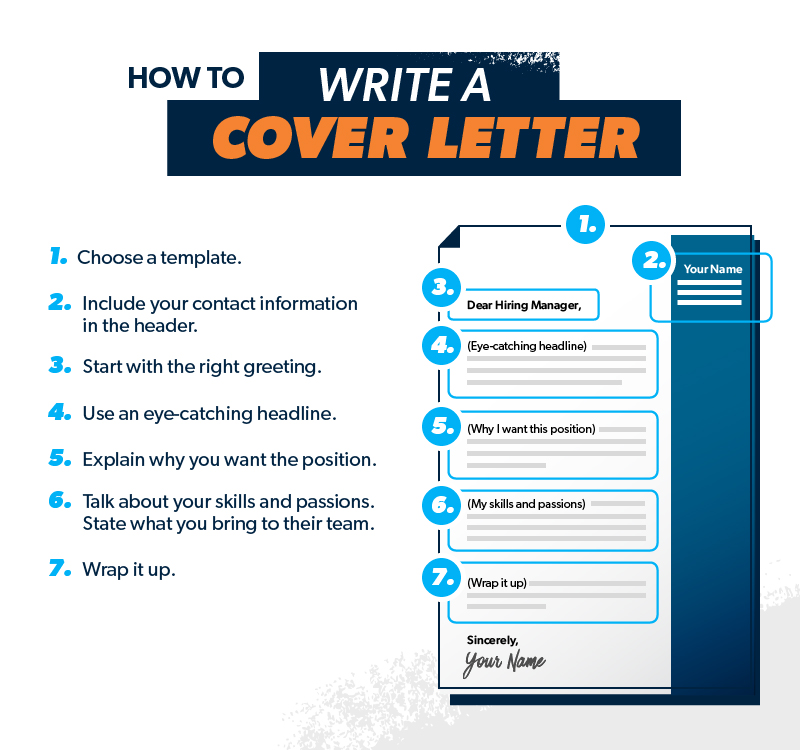
1. Choose a template.
There are plenty of easy-to-use, free cover letter templates that can help you figure out how to format your document. But it doesn’t need to be cookie-cutter—it should still show who you are and why you want to work at this specific company.
Think about it: When you’re writing a letter to a friend (or a text message, in this day and age), you make it personal and conversational. Each cover letter you write should be personalized for the company you’re applying to. Put yourself in their shoes. If you were hiring for this position, what would you be looking for?
No matter which cover letter template you choose, you should learn everything you can about the company and the position. Use that information to make your letter relevant and show you’ve done your homework. Keep it to around 300 words (that’s about one page), and remember, just like your resumé, don’t overdo the design. Leave the crazy fonts alone, folks. The goal is to look professional, not tacky!
2. Include your contact information in the header.
Even if your contact information is already on your resumé, you should still put it in the header of your cover letter. Here are the important things to include:
- Name
- Phone number
- Email address
- Any helpful follow-up information: a link to your portfolio, website or LinkedIn account (if you don’t have any of those, that’s okay)
This header can go at the top of the page underneath your name or in the top right corner. If you want to get really formal, you could also include the name of the person you’re addressing, the name and address of the company you’re applying to, and the date of application. This info can go on the left side of the page below the header.
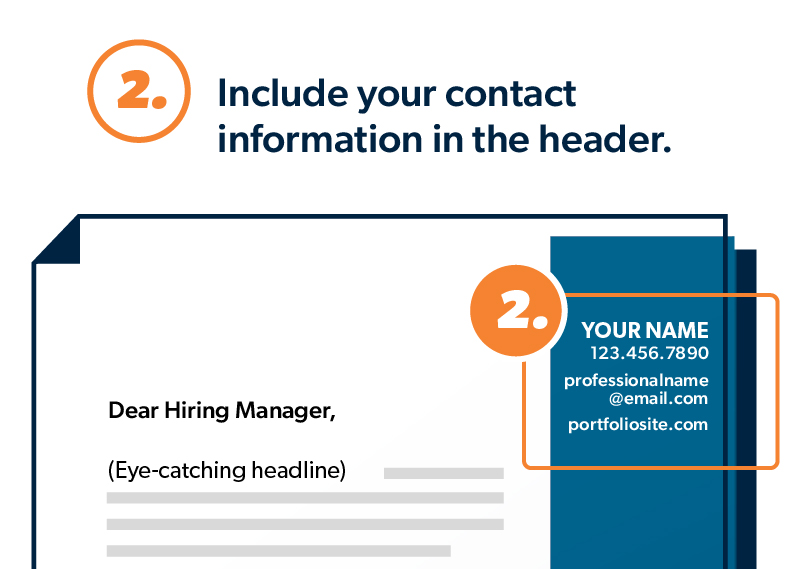
3. Start with the right greeting.
Don’t start out with “Dear Sir or Madam” or “To whom it may concern.” You’re not Shakespeare! Think about how you’d say hello to someone if you were sending them a polite and professional email. Here are some options:
- Name of hiring manager: If at all possible, directly address the person who will be handling your application. See if you can figure out who it is through a mutual connection at the company, the website, or maybe even LinkedIn.
- Name of company you’re applying to: If you can’t find the name of a specific person, “Dear [Company Name] Team” is always a safe bet.
- Generic title or position: Another option is to just say “Dear Hiring Manager” or “Dear [Team You’re Applying For] Hiring Manager.”
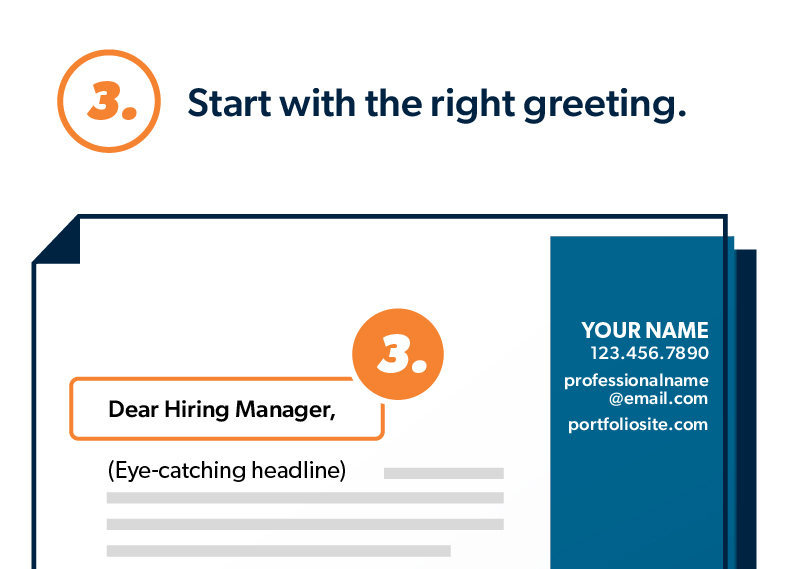
4. Use an eye-catching headline.
Treat your opening line like a hook. It needs to grab the reader’s attention and give them a reason to stick around. Make it count! For extra oomph, you can write this in large (and maybe even bold) letters to mimic a newspaper article headline.
You deserve to win at work. Our new book and assessment will show you how.
Think of the headline like a great social media post. When you’re mindlessly scrolling through Instagram or Facebook, what causes you to pause, squint your eyes, and take a closer look at what you see?
Once you’ve snagged their attention, it’s time to make your case about why you’re a good fit for the job.
5. Explain why you want the position.
This is your chance to wow the recruiter with your knowledge and enthusiasm about the company and role. Show them you’ve done your homework by touching on the mission, vision and values of the business. Then, explain why you’d be thrilled to contribute to their work.
6. Talk about your skills and passions.
This is the meat of the letter—but I want you to think lean. The HR team reading your application doesn’t have time for a novel. Write a couple of paragraphs, but make sure each one is only a few sentences.
Be humble—but confident—as you talk about your talents and skills. What makes you a good fit for this job? Include both hard skills (like coding or project management) and soft skills (like how you’re curious and always ready to learn something new).
Also, describe the passion that drives the work you do. What makes you come alive? What activities cause you to lose track of time? Let the recruiter sense your excitement for work.
7. Wrap it up.
This is where it gets fun. When you’ve found a job that combines what you do best with what you love to do most, you’ll be producing results that matter. Talk about the core motivation that helps you wake up every morning. Tell the hiring manager how you’ll contribute your skills and passions to help move the company forward.
Then, wrap it up by thanking the hiring manager for their time and attention.
Let me be clear about something: It’s not your job to follow up. It’s their job to reach out to you. If you lay out your case like I’ve described, they’ll have plenty of motivation to reach out to you for an interview. You’ve done the best you can do—now relax and let the chips fall where they may.
Other Tips for Writing a Cover Letter
- Share your purpose statement. A well-crafted purpose statement that identifies your talents (the things you do best), passions (the work you love), and personal mission (the results you care about) is a great way to help the reader understand your goals and whether you’d be a good fit for the role. For some extra help on that front, check out my guide on how to find your purpose.
- Use words and phrases the company uses. Take a look at their website and social media to get an idea of their core values and culture. Using a phrase from the company itself can let them know you’re dialed in to their culture. Show them from the get-go that you’re speaking their language. Just don’t get too cheesy with this one.
- Avoid clichés. While you’re writing about what makes you a strong candidate for the job, make sure your words are bold too. Don’t use cliché phrases like “I’m a team player” or “I think outside the box.” Instead, use specific examples to demonstrate those skills. Remember: Actions speak louder than words. Show, don’t tell.
- Proofread your letter! Grammar, spelling and accuracy matter. Every detail in your cover letter should look, feel and sound excellent. Don’t let a few typos rob you of your shot at your dream job! So, before you hit send, double-check your spelling and grammar. You may even want to print the letter and read it out loud as a final checkup, or have a friend look it over for you.
Cover Letter Examples
Whether you’re brand new to the workforce, finding the right fit for you, or an old pro moving up the ladder, there’s a way to write a cover letter that’s best for you and your experience. Here are a few examples of cover letters for new college graduates, middle managers, folks making a career change, and senior executives that you can use as a guide.
New College Graduate Cover Letter
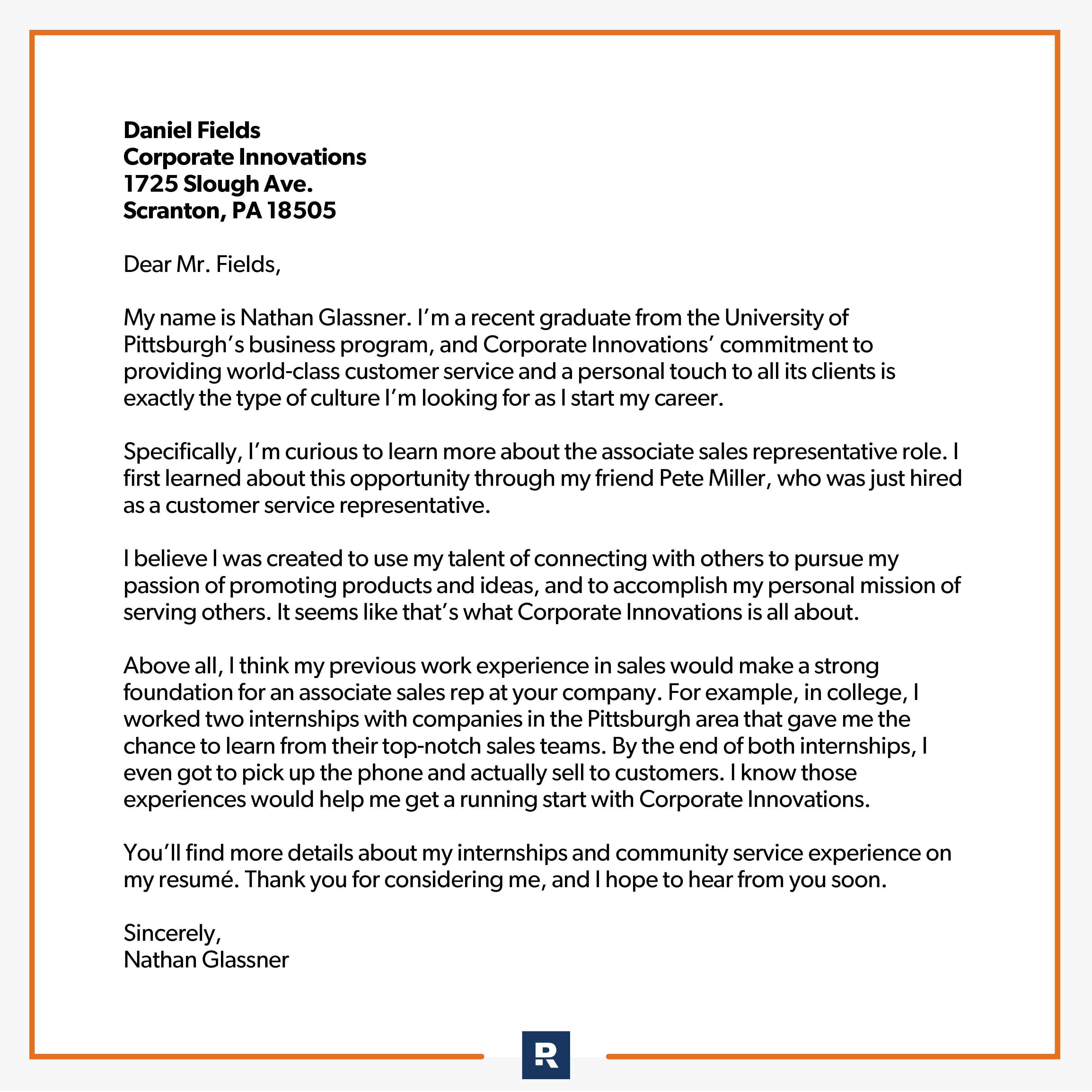
Mid-Career Cover Letter
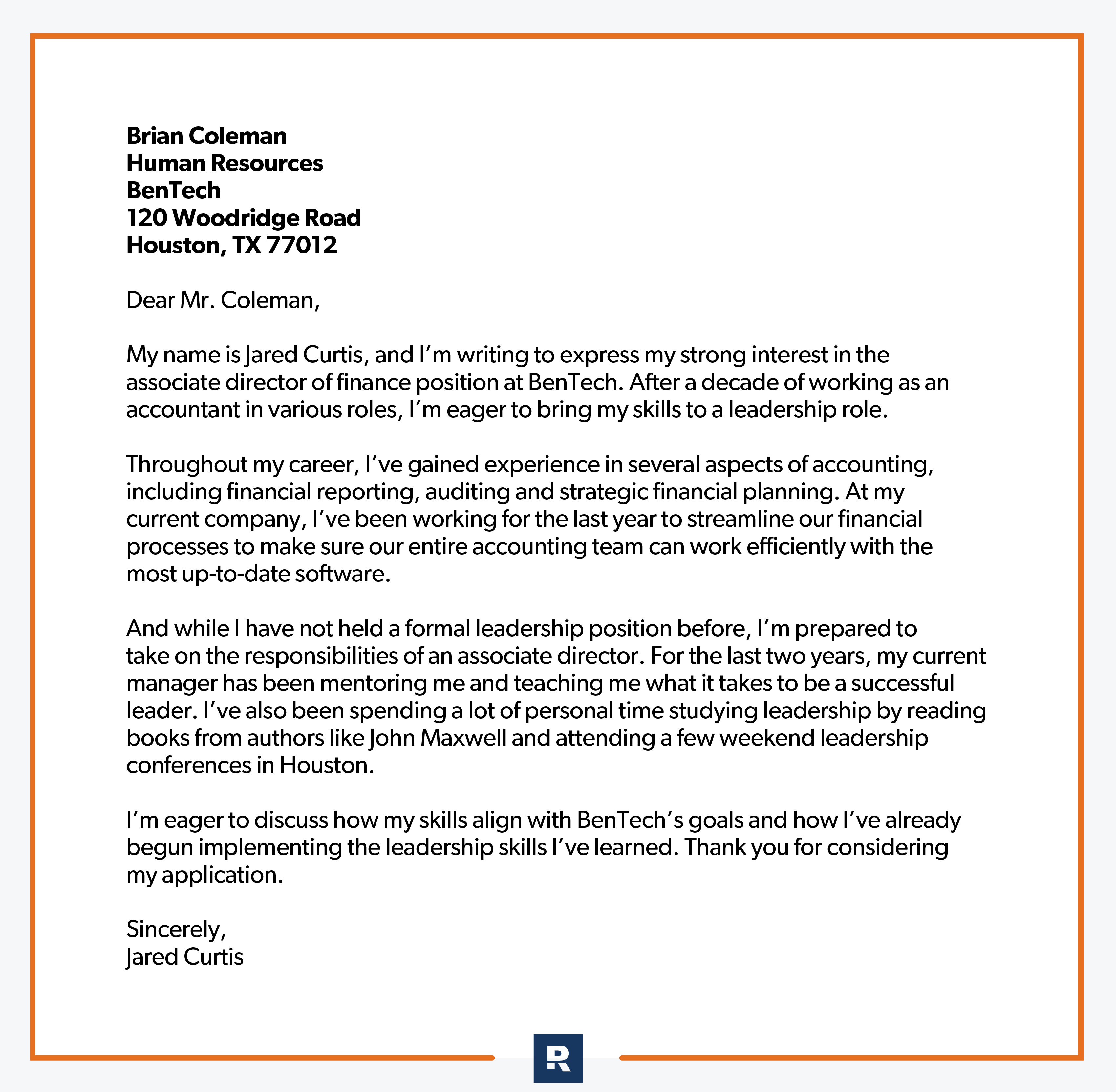
Career Change Cover Letter
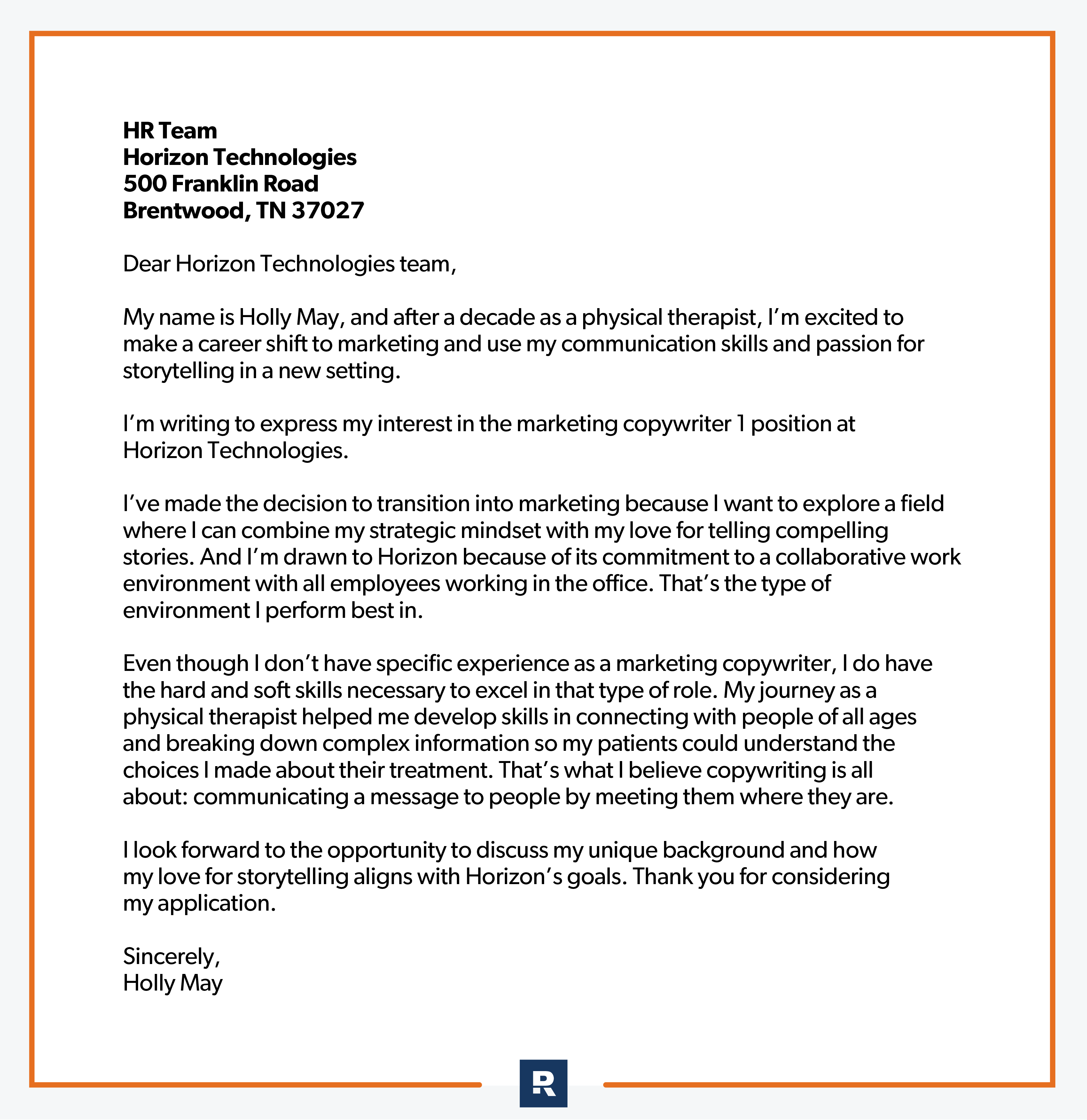
Senior Executive Cover Letter
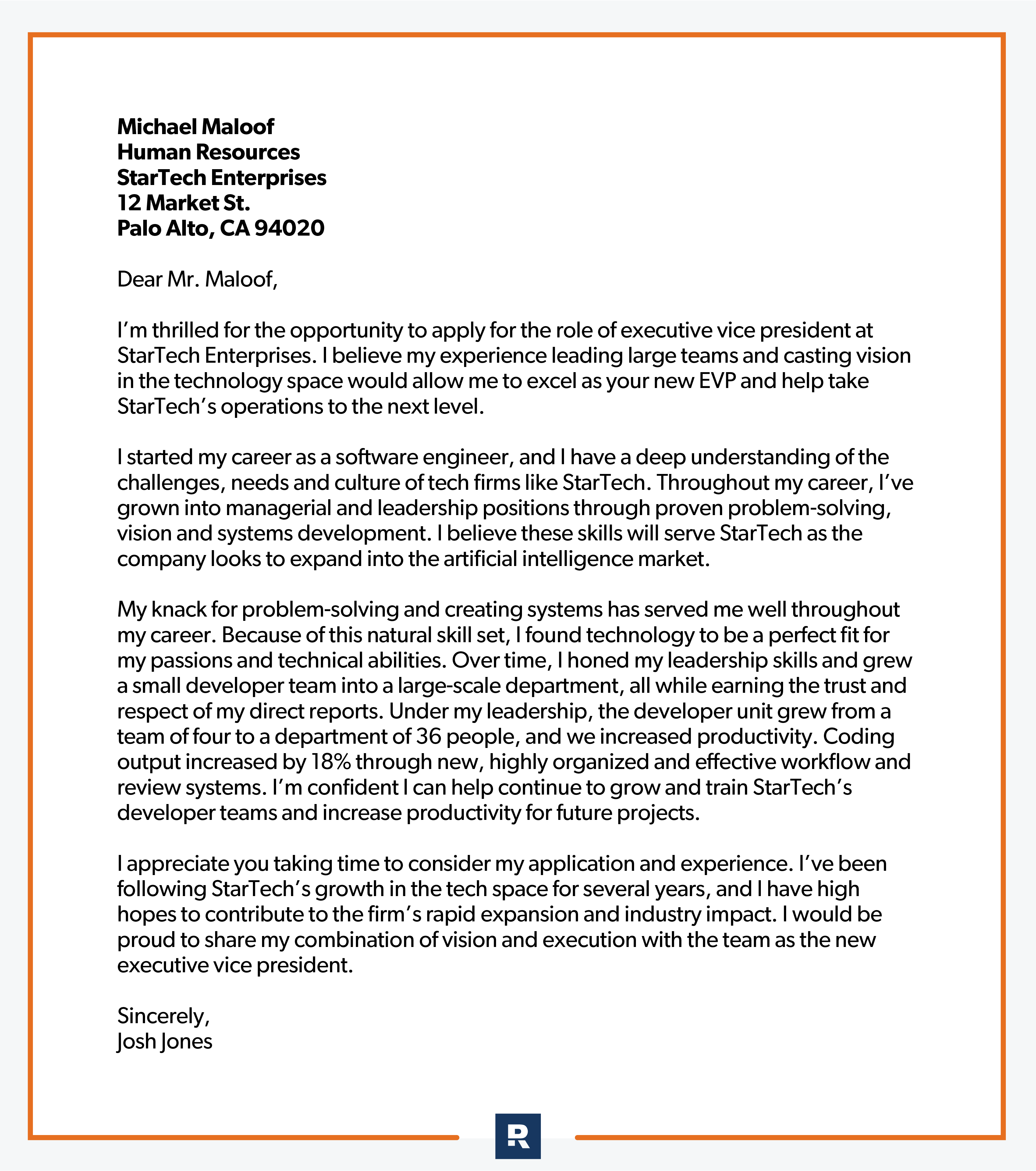
You’ve Got This!
Remember this: The goal of a cover letter is not to sound like a professional writer—so there’s no need to put that kind of pressure on yourself. Instead, cover letters are all about showcasing your skills, expressing your enthusiasm for the position, and making a compelling case for why you're the perfect fit for the job. If you follow these tips, that’s exactly what you’ll do.
Next Steps
Writing a great cover letter is only half the battle when you’re filling out a job application—it’s usually even more crucial to pair your cover letter with a high-quality resumé. And since most recruiters only spend an average of 7.4 seconds reading each resumé, yours needs to stand out from the pack in a big way.1
That’s why I created my free resumé guide. It’ll walk you through a five-step process for making your resumé a one-page guide that leads right to an interview. If you want to get noticed, you need to make your resumé noticeable, and this guide will help you do just that.
Frequently Asked Questions
-
How long should a cover letter be?
-
A good length to shoot for in your cover letter is around 300 words, or one page. Anything beyond that is too long.
-
What do I write in a cover letter?
-
When you write a cover letter, you should give a quick summary of your relevant experience and education while also explaining why you believe you’re a good fit for the job. It’s also a good idea to spell out why you want the job and how the company’s mission connects to your career goals.
-
What is a powerful opening sentence in a cover letter?
-
You should open your cover letter with an eye-catching headline that grabs the reader’s attention and gives them a reason to stick around. Think of the headline like a great social media post—it should instantly hook the reader.

